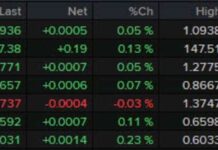The Biden administration is taking steps to address what it sees as the misuse of a trade loophole that allows low-value shipments into the United States without paying import duties and processing fees. This loophole, known as the de minimis exemption, has seen a significant increase in the number of shipments entering the country over the past decade, with estimates reaching over a billion.
New Rule Proposal Targets Shein and Temu
One of the key measures announced by the Biden administration is a new rule proposal that would prevent overseas shipments of products subject to U.S.-China tariffs from qualifying for the de minimis exemption. This move is aimed at curbing the abuse of the loophole by Chinese-linked online retail giants like Shein and Temu, which have been using the exemption to ship millions of dollars worth of goods directly to American consumers.
The de minimis exemption allows packages valued at less than $800 to enter the United States with minimal scrutiny, making it difficult for authorities to target and block illegal or unsafe shipments. By targeting products subject to tariffs under Section 301, Section 201, and Section 232, the new rule could disrupt the business model of companies like Shein and Temu, which rely heavily on the exemption to avoid paying import duties.
Impact on Retailers and Consumers
Traditional retailers typically import merchandise in bulk and distribute it through U.S.-based warehouses. In contrast, companies like Shein and Temu ship products directly from Chinese suppliers to American customers, bypassing the tariffs and scrutiny that other retailers face. By exploiting the de minimis exemption, these companies have avoided paying millions of dollars in import duties, giving them a competitive edge in the market.
Lawmakers have raised concerns that the exemption allows companies like Shein and Temu to import products made with slave labor without detection, as the packages are not subject to the same level of scrutiny and testing as other imports. By offering low prices due to the lack of import duties, these companies have been able to outcompete their rivals, leading to calls for reform of the de minimis rules.
In response to these concerns, the Biden administration has called for additional data to be provided for de minimis shipments, including the tariff classification number and the person claiming the exemption. This information will help authorities better track and regulate these shipments, ensuring that they comply with U.S. trade laws and regulations.
Congressional Action and Industry Response
In addition to the proposed rule changes, the White House has urged Congress to pass legislation to overhaul the de minimis rules. This would require lawmakers to address the loopholes and limitations of the current system, ensuring that all imports are subject to the same level of scrutiny and regulation.
Companies like Shein have acknowledged the need for reform, with executive chairman Donald Tang calling for a “complete makeover” of the de minimis rules to create a level playing field for all retailers. While Shein has stated that its pricing structure is not directly related to the exemption, it has faced criticism for sourcing cotton from banned regions and using potentially unethical labor practices in its supply chain.
Overall, the Biden administration’s efforts to target Shein and Temu through new rule proposals and calls for legislative action reflect a broader push to address the misuse of trade loopholes and ensure fair competition in the retail industry. By closing the de minimis exemption to products subject to tariffs and requiring additional data for shipments, the administration aims to level the playing field for all retailers and protect consumers from potentially harmful or unethical imports.

















